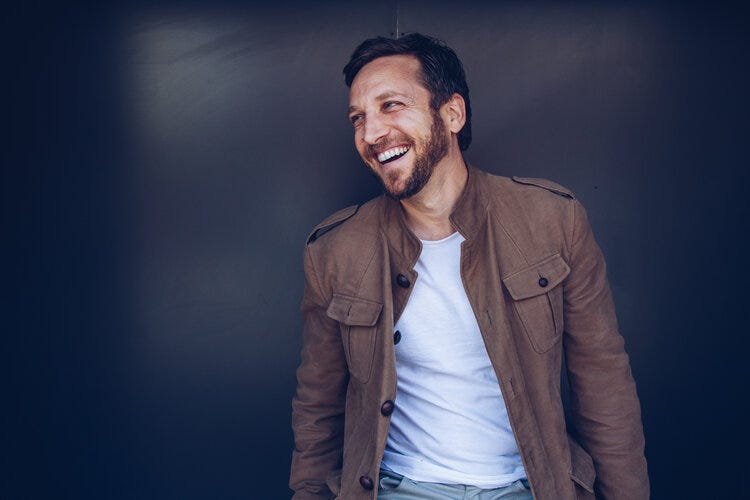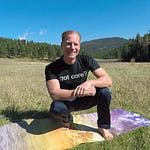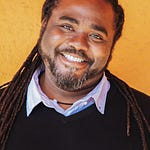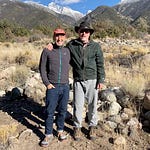This conversation is part of a series of interviews with various brothers and teachers, including many fellow writers, all of which are part of the body of work surrounding my book-length memoir An Ordinary Disaster—one man's proof that we can all learn to listen to ourselves, and to act upon the inner voice of our self, our sanity and our soul.
Today, I'm speaking with Dr. Adi Jaffe. Adi is the author of a best-selling book outlining a unique perspective on addiction called The Abstinence Myth and a nationally recognized expert on mental health, addiction, relationships and shame. He lectured in the UCLA Psychology department for most of a decade and was the Executive Director and Co-Founder of one of the most progressive mental health treatment facilities in the country before starting his own company called IGNTD, through which Dr Jaffe is changing the way people think about and deal with mental health issues. He’s now working on his next book, to be called Unhooked.
Adi and I met through a mens group called METAL, which is best explained by their catch-phrase “Together, we’re better,” which itself expresses a spirit of community and cooperation amongst men that also comes up in our interview.
If you’re a man and you’re not yet familiar with the world of mens work, and you’d like more community, connection and emotional depth in your life, I highly recommend finding a men's group to participate in.
In addition to all of my writing and podcast episodes, paid subscribers get full access to my entire memoir in progress, access to occasional bonus and AMA posts and chats—and the opportunity to order a copy of my book when it comes out for just the cost of shipping. If you’re enjoying my writing and podcast and would like to see more episodes like this one, please consider becoming a paying subscriber.
In the meantime, if you do enjoy this episode, please do take a moment to click the little heart button 🤍 to “Like” this post here on Substack. Think of it this way: your click on that little heart is the answer to the question—if someone asked you about it, would you recommend this piece to a friend?
As you listen, you might scan the questions at the bottom of the show notes, or just consider this one: which is what is your own understanding of how abstinence relates to addiction and recovery? And is absolute abstinence, an absolute requirement for recovery from addiction. And if so, why?
Show Notes
WHAT IS ADDICTION?
In an colloquial sense, “Addiction, broadly, is anytime we engage in habits that are bringing us harm of some sort, and we're having a hard time stopping them or slowing them down.”
In more clinical terms, it’s “people being prevented from functioning in their everyday life…”
SAMHSA’s new definition of addiction has about 40 million people, or more than 10% of the U.S. population suffering from one form of addiction or another, “but it's probably seventy to a hundred million people who struggle with the broader version of what we're talking about.”
“You're not really hooked on social media. You're escaping something else.”
“nobody talked to me about addiction until I was using meth all day every day.”
THE MYTH OF NORMAL
“there's a false dichotomy that gets created between ‘normal’ people and ‘addicts’ and ‘alcoholics.’”
There’s a kind of a cognitive misdirection that we have with the concept of normal. It's average—and nobody is the average. It's a statistical myth. Actually the variation within any “normal” is the full infinite range that exists.
“while we all try to be as normal as possible, nobody wants to be normal.”
we want to be different and accepted—different, but part of something…
what we mean by “normal” is included, invited… and understood.
HOOKED
“many people that I work with, part of the reason they developed their addiction is actually because they felt so abnormal, but felt like they had to temper that. They [felt like they] had to squash their individuality…” to be accepted.
…the way that our culture works these days, we're all primed to get hooked on stuff because we're all hungry for something that we're not getting…
“We do get hooked, but it's not the drugs or the porn…it's these feelings and fears and traumatic experiences and pain points from our childhood or earlier on…”
“a lot of people aren't willing to go get help for their addiction issues because they're not ready to quit.” and they’re under the impression that they will need to “quit” to get help. “There's a false notion in the addiction space that people have to be ready to quit from the beginning.” “90, 95% of people with addiction issues don't get help.”
DON’T FOCUS ON STOPPING
“It is actually wrong to try to stop yourself from doing anything. Stop trying to stop drinking—instead, start trying to fill up your life with other things that you love, that are meaningful to you...”
“I'm not against abstinence, I'm against demanding abstinence as the first step in people's recovery process.”
EXPLORE, ACCEPT, TRANSFORM
“The reason you use…is because it actually does resolve some of the problem short term—without actually causing any long term improvement in those problems. The problem [is] that [it] makes you far less aware of what is actually driving your behavior.”
“everybody looks to the alcohol and the weed and whatever the thing is to stop.”
“Drugs will always take back what they gave you. So if the alcohol gave you anxiety relief, it'll make you more anxious on the other side. In order to counter that, you have to drink more alcohol.”
“I always look for the underlying reasons.”
Similarly: depression is a symptom of not living well. “if you don't change it, nothing's gonna get better.”
COMPLEXITY
“our behavior, our environment, and our biology all play a role—You cannot separate one from the other.” “there are a lot of things in life that are just actually complex—So when people ask me like, is it biology or psychology? That's a dumb question. That's like asking me if a cucumber is a vegetable or green.”
our desperate search for attaching a definitive meaning to addiction or depression is a way of avoiding the real complexity of what's going on, which is that the way we live is causing most of these things and we don't really want to admit that because it's overwhelming.
“at the core core level most of us on this planet right now are under chronic stress”
Most people don't know what it feels like to actually be well.
CHANGE IS EASIER THAN IT OFTEN APPEARS
“we always see the world through our own eyes and our perspective.”
“there's a good probability that 10 years from now you will look at the world differently than you do right now… [and] when that shows up, you will have almost forgotten the view you had 10 years earlier.”
“There's not only one way to look at life.”
“one of the other false stories is that this recovery thing has to be really, really hard.”
“we've been told over and over and over that we can't”
for me, that “I can't'“, was like, “I can't by myself.”
“almost everybody I work with is initially so isolated. It's scary. … the drug use is the only time he gets to connect to people.”
“the work on the flip side, is to get connected.”
“you wanna create a life that is so good, so purposeful, so fulfilling you don't want to escape it.”
COLLABORATION
“I used to live in a scarcity mindset—I thought we live in a zero sum world where if I get something, I have to take it away from somebody else…” “I still have to go do the work; I don't just sit back and expect it to happen, but I didn't realize I could shift my mindset from scarcity to abundance in such a complete way.” → great lesson for men in particular, to learn to collaborate instead of compete.
You can find Adi Jaffe, his book, and everything else at https://www.adijaffe.com and his company IGNTD. He’s also on Instagram at https://www.instagram.com/dradijaffe/
Wheel of Life assessment — another version
The METAL men’s group—“Together, we’re better.”
SAMHSA—The Substance Abuse and Mental Health Services Administration, part of the U.S. Department of Health and Human Services.
The music is “Unhooked” by Drew Barefoot.
Further Reading
You might be also interested in some of my other writing on alcohol and addiction, especially Change of Heart, A Five-Minute Love Affair With Natural Wine, and Five Years Sober*.
I also recommend the following books on alcohol and addiction:
Annie Grace, This Naked Mind — my favorite book on how to change your relationship with alcohol
Maia Szalavitz, Unbroken Brain
Stanton Peele, Love and Addiction
Adi Jaffe, The Abstinence Myth
Gabor Mate, The Myth of Normal
David Poses, The Weight of Air: A Story of the Lies about Addiction and the Truth about Recovery
here on SubstackAmy Dresner, My Fair Junkie: A Memoir of Getting Dirty and Staying Clean
Leslie Jamison, The Recovering: Intoxication and Its Aftermath
Carl Erik Fisher, The Urge: Our History of Addiction
Johann Hari, Lost Connections
Caroline Knapp, Alcohol, A Love Story
Mary Carr, Lit
Marc Lewis, The Biology of Desire: Why Addiction Is Not a Disease
…Do stick around, I’ve got some questions for you:
What is your own understanding of how abstinence relates to addiction and recovery? And is absolute abstinence, an absolute requirement for recovery from addiction. And if so, why?
If you’ve ever felt compelled to do something, what was the underlying cause of the compulsion?
What is your own relationship with addiction and addictive patterns? Even if you’ve never been addicted to anything at all, what do you know, or think you know, about the mechanisms of addiction? Is there anything that you feel that you need to do—and is it something that you also really want to do?
What do you think “normal” is? Really?
Have you ever had the experience of making a significant change to how you are living? What was it like before hand? Afterwards?
Who else would you like to hear interviewed on BROTHERS AND TEACHERS?
Please join the conversation by answering any or all of these in the comments below.
Become a subscriber
…or just share this post with some folks that you love:










